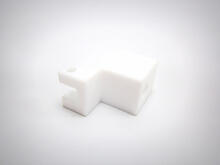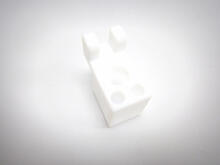PTFE & FEP Teflon Machining
Polytetrafluoroethylene, commonly referred to as PTFE Teflon®, is a synthetic fluoropolymer of tetrafluoroethylene first discovered in 1938 by DuPont. Additionally, it is one amongst the three fluorocarbon resins within the fluorocarbon category composed entirely of fluorine and carbon. For this reason, it is suitable for numerous applications. Additional resins in this cluster also referred to as Teflon®, are PFA and FEP. Mechanical PTFE Teflon® material is a more economical grade composed of 25% regrind PTFE, meaning there could be trace amounts of contamination that may not have an effect on its physical properties, however, may have an effect on its electrical nonconductor properties. The Teflon® material Vanderveer Plastics machines meet several ASTM requirements, including ASTM D 1710, for military and commercial specifications.
PTFE Machined Parts
There are many parts that utilize these materials. Vanderveer Plastics works with PTFE and FEP Teflon to machine the following parts:
- Cabling and electrical insulators
- Semiconductor components
- High-temperature electrical parts
- Bushings and bearings
- Gears
- Valve components
- Cabling solutions
- Non-lubricated bearings
- O-rings
- Seals
- Capacitors
- Gaskets
PTFE & FEP Teflon Machining Advantages
PTFE material resists attack by heat, as well as from just about all chemicals. it's insoluble in all organics, with the exception of some exotics. Its electrical properties are excellent making it a popular option for machined parts. Though it's high impact strength, its resistance to wear, durability and creep resistance are low as compared to alternative engineering grade thermoplastics. Mechanical properties are often improved by adding fillers like glass fiber, bronze, Delrin, carbon, and/or graphite.
PTFE Rod, Sheet, and Tube exhibit the lowest electrical constant and lowest dissipation factors of all solid materials. Due in part to its sturdy chemical linkage, Teflon® PTFE Sheet, Rod, and Tube shows little or no attraction for dissimilar molecules. All combined, leading to a coefficient of friction as low as 0.05. Once again, as a result of this chemical bonding, PTFE Teflon® resins are nearly insoluble.
Teflon® can be machined to close tolerances, letting Vanderveer Industrial Plastics deliver the exact PTFE, FEP, PFA machined parts you need.


Teflon® Machining Profile
Benefits of PTFE, FEP, & PFA Machining:
- Excellent dielectric properties
- Inertness to most chemicals
- High heat and chemical resistance
- Very low coeffiecient of friction
- Excellent radiation resistance
- Zero moisture absorption
- Relatively insensitive to power frequency
- Machinability
Military and Commercial Specifications:
Extruded and Molded Rod:
- Mil-P-19468 canceled and superseded to ASTM D 1710
- 22296 canceled and superseded by ASTM D 1710
- Mil-R-8791 replaced by AS8791
Extruded and Molded Rod:
- ASTM D 1710 Type 1, Grade 1, Class A
- Type 3 Non-Critical, Mechanical grade
- Type 4 Utility Grade, Mechanical Grade
- Grade 2 Mechanical PTFE
- Class A Normal dimensional stability
- ASTM D 4894 Resin specification only Type III, & Type IV
Extruded Sheet:
- Mil-P-22241A replaced by ASTM D 3293
- ASTM D 3293 withdrawn & replaced by ASTM D 3294
Molded Sheet:
- ASTM D 3294 Type 2, Grade 1, Class B or C
Use Our Comparison Tool to Compare Materials
Common Comparisons
- Acetal vs. Teflon® PTFE/FEP
- Delrin® vs. Teflon® PTFE/FEP
- HDPE vs. Teflon® PTFE/FEP
- Nylon vs. Teflon® PTFE/FEP
- PEEK vs. Teflon® PTFE/FEP
- Polypropylene vs. Teflon® PTFE/FEP
More Comparisons
More Comparisons:
- ABS vs. Teflon® PTFE/FEP
- Acrylic vs. Teflon® PTFE/FEP
- FR-4 vs. Teflon® PTFE/FEP
- FR-5 vs. Teflon® PTFE/FEP
- G-9 vs. Teflon® PTFE/FEP
- G-10 vs. Teflon® PTFE/FEP
- G-11 vs. Teflon® PTFE/FEP
- G-3 vs. Teflon® PTFE/FEP
- G-5 vs. Teflon® PTFE/FEP
- G-7 vs. Teflon® PTFE/FEP
- Grade C Canvas vs. Teflon® PTFE/FEP
- Grade CE Canvas vs. Teflon® PTFE/FEP
- Grade L Linen vs. Teflon® PTFE/FEP
- Grade LE Linen vs. Teflon® PTFE/FEP
- Grade X Paper vs. Teflon® PTFE/FEP
- Grade XX Paper vs. Teflon® PTFE/FEP
- Grade XXX Paper vs. Teflon® PTFE/FEP
- Nylatron® vs. Teflon® PTFE/FEP
- Plexiglas vs. Teflon® PTFE/FEP
- Polycarbonate vs. Teflon® PTFE/FEP
- LDPE vs. Teflon® PTFE/FEP
- PVC vs. Teflon® PTFE/FEP
- Rulon® vs. Teflon® PTFE/FEP
- Ryton vs. Teflon® PTFE/FEP
- Teflon® PTFE/FEP vs. Torlon®
- Teflon® PTFE/FEP vs. UHMW
- Teflon® PTFE/FEP vs. Ultem®
- Teflon® PTFE/FEP vs. Vespel®
Several grades of Teflon® are available. For additional information on Teflon® plastic materials, contact your local Vanderveer Industrial Plastics representative or call Vanderveer Industrial Plastics at 714.579.7700.
Click here to submit a Request for Quote
Or call us today at 714.579.7700